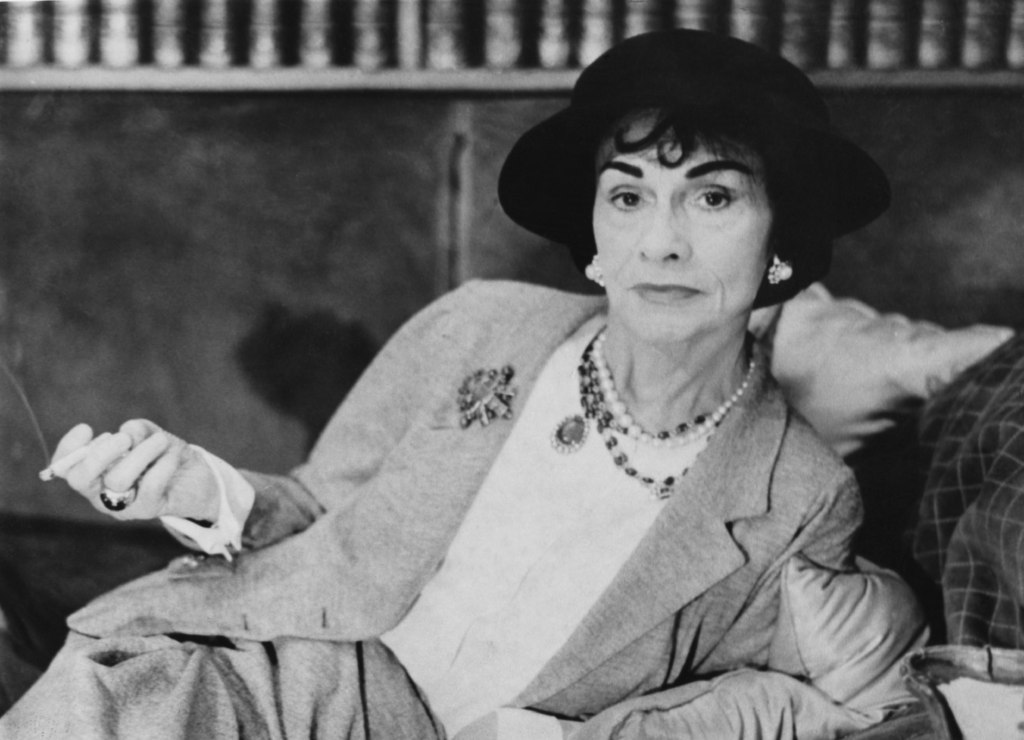Coco Chanel, born Gabrielle Bonheur Chanel on August 19, 1883, in Saumur, France, is one of history’s most influential fashion designers.
Renowned for her revolutionary approach to women’s fashion, she introduced styles emphasizing comfort and elegance, liberating women from the constraints of corsets and elaborate dresses.
Chanel’s rise to fame began in the early 20th century, particularly with her iconic creations, such as the Chanel suit and the little black dress.
Her innovative use of jersey fabric and her signature perfume, Chanel No. 5, further solidified her status as a fashion icon.
Profile
- Full name: Gabrielle Bonheur Chanel
- Date of birth: August 19, 1883
- Age as of 2024: N/A (deceased)
- Gender: Female
- Place of birth: Saumur, France
- Nationality: French
- Profession: Fashion designer, businesswoman
- Height: N/A
- Parents: Eugène Chanel (father), Jeanne Devolle (mother)
- Siblings: Antoinette Chanel, Alphonse Chanel, Augustin Chanel, Lucien Chanel, Julia Chanel, Pierre
- Spouse: N/A (never married)
- Children: N/A (no children)
- Relationship status: N/A
- Religion: N/A
- Ethnicity: French
- Net worth: $10 million
Early Life and Education
Coco Chanel is now remembered as a pioneering figure in fashion. She was born on August 19, 1883, in Saumur, France.
When she was 12 years old, her mother passed away, and Chanel was placed in an orphanage run by nuns who taught her how to sew—a skill that would become fundamental to her career. Her father abandoned the family shortly after her mother’s death.
Chanel’s early years were marked by hardship and poverty. She later moved to Moulins, where she worked as a seamstress and performed as a singer in local cafés.
During this time, she adopted the nickname “Coco,” which is believed to have originated from a song she sang.
At the age of 20, Chanel became involved with Étienne Balsan, a wealthy man who supported her fashion ambitions. This relationship opened doors for her to enter the world of haute couture.

Personal Life
Coco Chanel’s personal life was as complex as her professional one. Although she never married, she had several significant relationships with influential men.
Her most notable relationship was with Arthur “Boy” Capel, a wealthy Englishman who financially supported her first shop. Their relationship lasted until his tragic death in a car accident in 1919.
Chanel also had affairs with prominent figures such as Igor Stravinsky and the Duke of Westminster.
Despite these romantic entanglements, she remained fiercely independent and focused on building her fashion empire.
Career
Chanel opened her first millinery shop in Paris in 1910, initially selling hats. By incorporating menswear elements into women’s clothing—such as jersey fabric—she quickly gained popularity among fashionable women seeking comfort over constriction. In 1915, she introduced casual chic styles that appealed to modern women.
Her designs revolutionized women’s fashion; her most famous contributions are the Chanel suit and the little black dress. In 1921, she launched her iconic perfume, Chanel No. 5, symbolizing luxury and sophistication.
During World War II, Chanel closed her shops and faced scrutiny for alleged collaborations with Nazi officials while living at the Ritz Paris hotel. After the war, she spent nearly a decade in exile before returning to fashion in the early 1950s.
Awards
Coco Chanel’s contributions to fashion were recognized posthumously through various awards and honours:
- Inducted into the Fashion Walk of Fame in New York City (1983)
- Numerous exhibitions dedicated to her work at prestigious museums worldwide.
Net worth
When she died on January 10, 1971, Coco Chanel’s net worth was estimated at approximately $10 million. This wealth stemmed from her successful fashion empire and enduring brand legacy.
Death
Coco Chanel died on January 10, 1971, in Paris at the age of 87.
Her death marked the end of an era for haute couture but left behind an indelible legacy that continues to influence fashion today.
Controversy
Coco Chanel’s life was not without controversy. Her alleged involvement with Nazi officials during World War II has been a subject of intense scrutiny and debate among historians.
While some accounts suggest that she collaborated with Nazis for personal gain—particularly to secure the release of family members—others argue that she was primarily motivated by survival during tumultuous times.
Chanel’s relationship with Baron Hans Günther von Dincklage, a German intelligence officer during the war, raised questions about her political affiliations and moral choices.
Despite being arrested by French authorities after the war for questioning regarding her actions during this period, she was never charged with any crimes.
Additionally, some critics have pointed out instances of anti-Semitism in her remarks throughout her life.
These controversies have complicated perceptions of her legacy. At the same time, many celebrate her contributions to women’s liberation through fashion design, while others criticize her for compromising ethical standards during a dark chapter in history.

Social Media
Books
- “Chanel: A Woman of Her Own” by Axel Madsen
- “Coco Chanel: The Legend and The Life” by Justine Picardie
- “Chanel: The Illustrated World of a Fashion Icon” by Megan Hess
NOTICE!! NOTICE!! NOTICE!!
DISCLAIMER!! : Every Biography and Contents Published On TheCityCeleb are For Knowledge Reason, Don’t Hesitate to Reach Out to Us/Contact for Any Correction || Suggestion || Copyright!!
CORRECT@thecityceleb.com
Call: (+234) 815-413-5400 || Email: info@thecityceleb.com
WhatsApp: (+234) 703-964-6947



